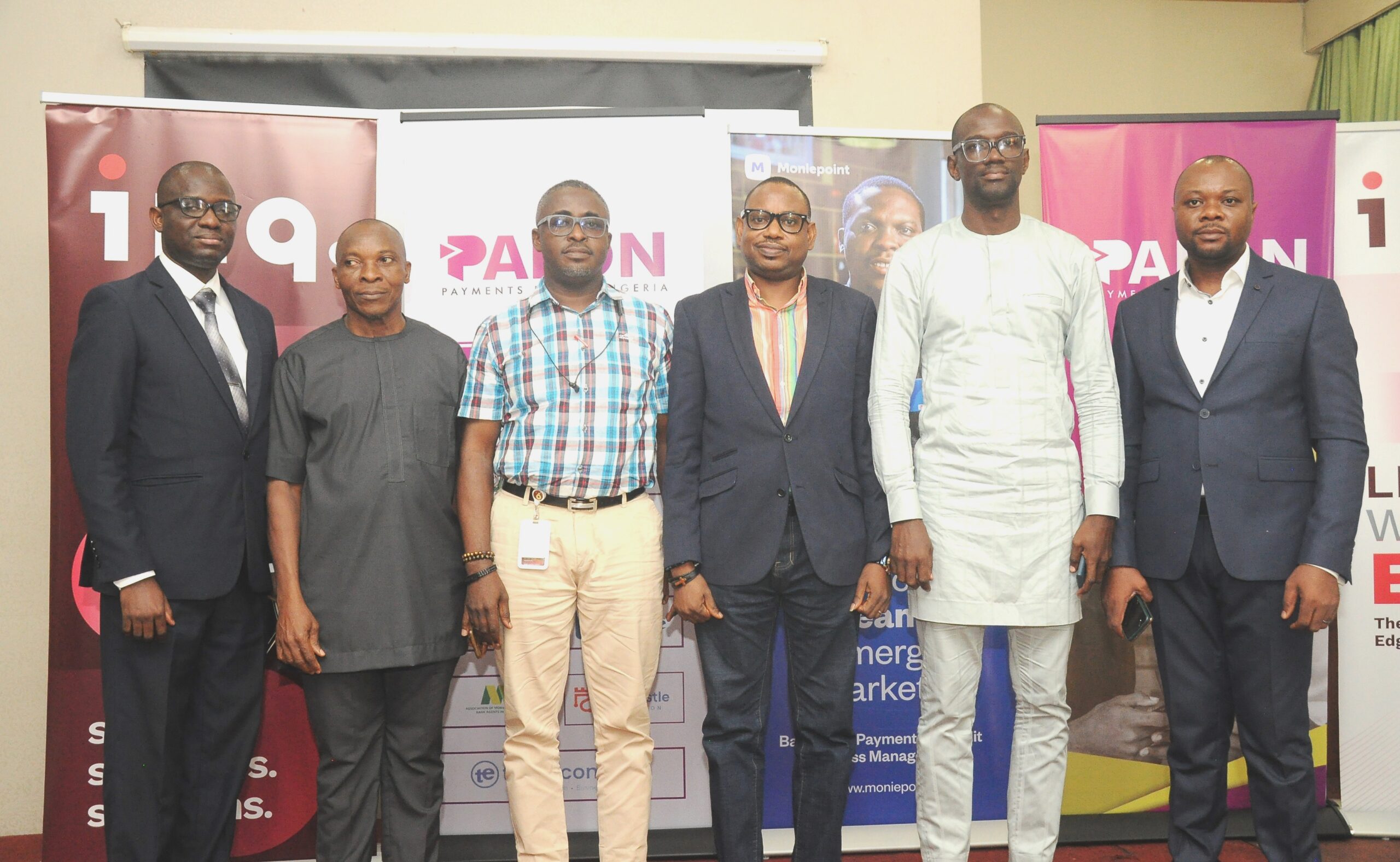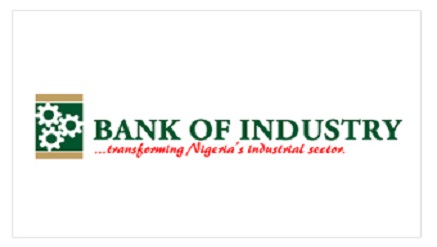E-Financial
PAFON 1.0: Experts Harp on Stricter Data Privacy Measures in Payments Ecosystem in AI Era

Mr. Festus Amede, Chairman of the Committee of Chief Information Security Officers of Nigerian Financial Institutions (CCISONFI) has identified Data Minimization Principles, User Consent and Control, as well as Compliance with Privacy Regulations as important elements in protecting privacy in payments.

L-R: Olusola Odediran, Chief Information Security Officer, NIBSS/representative of Chairman, Committee of Chief Information Security Officers of Nigerian Financial Institutions; Chike Onwuegbuchi, co-founder, TechCastle Foundation; Adekunle Ajayi, Product Manager, Cloud and Digital Solutions, inq. Digital Nigeria Ltd; Abidemi Akinola, Chief Compliance Officer, Remita; Efemena Ogie, Head, Partnership, Monipoint Inc., and Peter Oluka, Editor, Techeconomy, during, the Payments Forum Nigeria (PAFON 1.0) event on, ‘Payments: Trust, Security and Privacy in AI era’ held in Lagos recently.
Amede who was represented by an executive member of CCISONFI, Mr. Olusola Odediran (also, the Chief Information Security Officer) Nigeria Inter-Bank Settlement System (NIBSS), spoke during his keynote presentation at the maiden edition of Payments Forum Nigeria (PAFON 1.0) held at Oriental Hotel, Lagos on Thursday.
His presentation themed, ‘Payments: Trust, Security and Privacy in the AI Era,’ explored the critical aspects of trust, security, and privacy in payments, and provided insights into the challenges, solutions, and future trends in safeguarding transactions in the digital landscape.
The CCISONFI chairman stated that although the payment industry enjoys such regulatory oversights arising from the Nigerian Data Protection Act (NDPA) and Data protection laws, the Payment Card Industry Data Security Standard (PCI DSS), and the compliance requirements for businesses, the industry has balanced security and convenience relying on user experience in payment security, seamless authentication methods, and biometric and tokenized payments.
On how emerging Technologies will impact the payment industry, he disclosed that while Blockchain will be deployed to ensure secure transactions, Artificial Intelligence and Machine Learning will be used in fraud prevention even as privacy-preserving computing impact cannot be underestimated.
Amede called on players in the payment industry to continue to educate consumers by providing them with tips on how to secure online payments, how to recognise phishing attempts, and the importance of keeping software updated.
He listed some of the best practices for businesses including regular security audits and penetration testing; employee training on security protocols; and ensuring collaboration with payment security experts.
Speaking further on the need to build trust in payment systems, Amede, who is also the CISO of Zenith Bank Plc emphasised the importance of trust for consumer adoption, transparency in transactions, and commitment to securing the payment infrastructure.
He stated that the Payment Systems are exposed to such threats and vulnerabilities as Cyber Attacks and Data Breaches, Phishing and Social Engineering, and malware and ransomware.
Ikenna Ndugbu, the chief compliance officer, represented by Isoken Aigbomian, the regional sales Manager, Moniepoint, highlighted the evolution of Moniepoint into a leading payment processor, stating, “We started off with a virtual account service where we automated payments or transfers, allowing customers and businesses to make and receive payments seamlessly through transfers. This was what catapulted and was modified into the limelight and household name that seems to be.”
Aigbomian emphasized the company’s focus on providing flexible payment options to businesses across various sectors, stating, “Today, Moniepoint offers a wide variety of payment options to businesses. There is an online payment platform, in-person payments option and then there are the cash payments via our ATM network, which is almost, I think, one of the largest, as well.”
She explained how Moniepoint MFB identified the need for a seamless payment experience and developed innovative solutions to address it. “So, what we did was we looked inward, and we said the most popular means of payment in Nigeria is transfer. So we worked with our engineers and were able to build an infrastructure.”
Roosevelt Elias, the founder of Payble, noted the importance of data privacy and security in the age of digital payments, stating, “It is essential to preserve the details of such trusted transactions, as they often hold significant importance for the company’s outcomes and operations.”
He endorsed cautious use of data and highlighted the need for AI encryption and compliance-based companies to protect user privacy and ensure regulatory compliance.
On the other hand, Peter Evbota, sales director at inq. Digital Nigeria Limited, spoke on artificial intelligence (AI) and its ability to transform sectors, particularly in data analytics and security.
He emphasized the power of AI in processing both structured and unstructured data, highlighting its ability to detect patterns and provide valuable insights.
Earlier in his welcome address, Mr. Chike Onwuegbuchi, co-founder of TechCastle Foundation, organisers of the event, while giving insight into why the forum was berthed, said payments are very critical in the economy of every country including Nigeria.
“Last year, before the elections, we witnessed what Nigerians faced in the payments system- ATMs were not working to dispense cash, and at merchant locations, it was difficult to make payments with banks’ PoS thanks to Moniepoint and few others that came to the rescue,” he said.
Onwuegbuchi noted that there had been issues of declined transactions and customers’ accounts debited, in addition to an existing systemic fraud, misinformation and lack of information that have led to customers losing their money to fraudsters.
“After looking at these issues and many more, we at TechCastle Foundation decided to create a platform where stakeholders could discuss these issues with the objective of making our Payments systems better,” he said.
He stated that the essence of the forum was to make the ecosystem better for every Nigerian as operators, regulators and end users are expected to discuss to find a way to make the system better.
He added that trust issues in payments, security and other industry-related issues were to be discussed at the forum by cybersecurity experts who have distinguished themselves in working with money deposit banks to ensure that cybercriminals didn’t steal money in the bank.
The inaugural edition of the Payments Forum Nigeria was a cross-industry platform that focused on addressing issues that require broad cooperation and coordination across many constituents in the payments industry.
PAFON 1.0, sponsored by Moniepoint, Digital Encode Limited, Cybervergent, inq.Digital and Payble with support from the Central Bank of Nigeria (CBN), provided participants with an inside look at the Payments industry, offering perspectives from key stakeholders, including payment networks, technology innovators, leading merchants, issuers, acquirers, and payment processors.
E-Financial
CBN Expresses Concern Over Foreign Investments in Nigeria Fintechs

The Central Bank of Nigeria in its 2025 Fintech Policy Insight Report, has raised concern over Nigeria’s fintech sector heavily dependent on foreign investment, exposing it to swings in global markets.

The report said the sector has shown resilience despite global economic pressures, but warned that reliance on external capital leaves it vulnerable to market fluctuations.
It would be recalled that startups in the country raised $520m in equity funding in 2024, down from about $747m in 2019, when Nigeria captured roughly 37 per cent of all African startup investment.
This performance, amid significant global macroeconomic gyrations, underscores Nigeria’s position as a key hub for financial innovation. The sharp rise in interest rates in advanced economies during 2022 contributed to a slowdown in venture capital funding.
“These dynamics highlight the importance of developing domestic funding avenues, such as leveraging Nigeria’s capital markets, to reduce currency risk and sustain fintech growth,” the apex bank stated.
Olayemi Cardoso, CBN Governor, said Nigeria is undergoing a rapid and significant financial evolution. Over the past decade, the nation’s fintech landscape has grown from a handful of startups into one of Africa’s most vibrant innovation ecosystems.
“Even amid global economic headwinds, Nigerian fintech firms continued to attract investment and drive change. Today, with improved stability of our currency and domestic economy, it is clearer than ever that financial innovation can advance inclusion at scale,” the executive commented on the report.
In addition to funding, the central bank underscored Nigeria’s continued leadership in digital financial infrastructure. More than 25 per cent of all electronic transactions in Africa’s most populous nation are processed via real-time payment channels, with close to 11 billion transactions processed in 2024, up from five billion in 2022. The report described Nigeria’s instant payments platform, NIBSS NIP, as among the most mature and widely adopted globally.
The report also mentioned the need to strengthen system integrity and reputation, pointing to compliance reforms, anti-money laundering supervision, and consumer protection measures as key priorities for sustaining investor confidence.
By focusing on domestic funding, regulatory modernisation, and innovation infrastructure, the CBN aims to position Nigeria not only as a fintech front-runner but also as a rule-setter whose regulatory lessons are relevant to peer emerging and high-growth economies globally, the central bank said.
Stakeholders surveyed by the CBN also cited compliance costs as a significant challenge to innovation. According to the report, 87.5 per cent of respondents said that the cost of meeting regulatory and risk requirements significantly impacts their capacity to innovate, while delays in product approvals and regulatory timelines also remain major bottlenecks.
The report noted that 62.5 per cent of fintech firms plan to expand regionally, and there is strong support for regulatory pass-porting frameworks to enable compliant expansion into other African markets. However, the CBN warns that such cross-border growth requires a stable funding base and coordinated regulation.
E-Financial
UBA’s Easy and Instant Account Opening Thrills Returnee

After a few years abroad, I returned to Nigeria and faced a dilemma. Let me tell you all about it.

UBA
A few days ago, I was dragging my luggage through Murtala Muhammed International Airport. Everything felt bright and beautiful. Not necessarily in aesthetics, but in the vibrant colours, sounds, and energy all around. After three intensive years in the UK, I was finally back home. Ready for the hustle and bustle of Lagos life, and yes, the comfort of my parents’ home.
The plan was simple. Settle down and get my life on track. I’d sorted the job, and I had my person. But then came my dilemma. Money!. This doesn’t mean I was short of it or had too much of it. The real issue is where to actually keep and manage it in this country with daily dramatic happenings. With just two weeks left before I resumed at my new workplace, I had no time for long queues, endless paperwork, or the classic “Nigeria bank stress.” So, I needed an account, and I needed it fast.
So I turned to my best friend, Google, and typed, “Instant account opening in Nigeria.”
In less than a second, I was redirected to the United Bank for Africa instant account opening portal. A few taps later, and I had a fully functional account. Just like that. I could receive my funds, transfer my funds, and start building my financial life here again.
In less than a second, I was redirected to the United Bank for Africa instant account opening portal. A few taps later, and I had a fully functional account. Just like that. I could receive my funds, transfer my funds, and start building my financial life here again. Talk about ease, and this beautiful experience truly exemplified that definition
I was genuinely amazed. It felt too easy, almost suspiciously easy. But it was real, I mean, really soft like they were just thinking all about me while developing this new feature.
If you’re like me and pressed for time, avoiding unnecessary stress, or just ready to sort your finances without the hassle, consider this your sign.
UBA’s instant account opening is a game-changer. No queues to cut into your precious time. Just you and your phone, minutes away from being banked.
Get started here: https://aop.ubagroup.com
Trust me, if I could do it between unpacking and settling in, you can do it too. Your future self will thank you.
E-Financial
BOI Secures CBN Nod for Sharia Banking, Unlocks Ethical Funding Boom

Bank of Industry (BOI) has received Central Bank of Nigeria (CBN) approval to launch a Non-Interest Banking (NIB) Window, expanding ethical financing for underserved businesses nationwide.

BOI
The move positions BOI to mobilise Sharia-compliant funds, finance assets and raw materials without interest, and target MSMEs plus high-impact sectors previously sidelined by conventional loans.
Divisional Head of Public Relations, Theodora Amechi, said the window aligns BOI with social goals, boosting real economy support and sustainable industrial growth.
MD/CEO Dr. Olasupo Olusi hailed it as a “pivotal moment,” enabling the bank to serve faith-sensitive enterprises shunning riba-based loans.
Analysts see it as CBN’s vote of confidence in BOI’s governance, set to spur innovation and inclusive financing for Nigeria’s ethical business segments.
Established in 1959 as Nigeria’s top Development Finance Institution, BOI now strengthens its drive for broad-based economic transformation.

 General News2 days ago
General News2 days agoGlobacom Donates ₦1Bn to Lagos State Security Trust Fund

 Telecom2 days ago
Telecom2 days agoAirtel Nigeria Commits to Upgrade of its Network Infrastructure for Improved Quality of Service

 E-Business2 days ago
E-Business2 days agoPwC Reveals AI Scaling Gap Slows Africa’s Digital Transformation

 News2 days ago
News2 days agoCIoD, NIPSS Partner to Deepen Governance, Leadership Standards

 News2 days ago
News2 days agoNRS Chairman Outlines Ways Nigeria can Move from Potential to Economic Prosperity

 E-Financial2 days ago
E-Financial2 days agoEcobank Profit Jumps 29 Percent to N950Bn

 General News2 days ago
General News2 days agoWIEG to host Nigeria’s first International Investment Summit in Lagos

 News2 days ago
News2 days agoOrya, Ex-NEXIM MD Jailed 490 Years for N2.4Bn Fraud



























